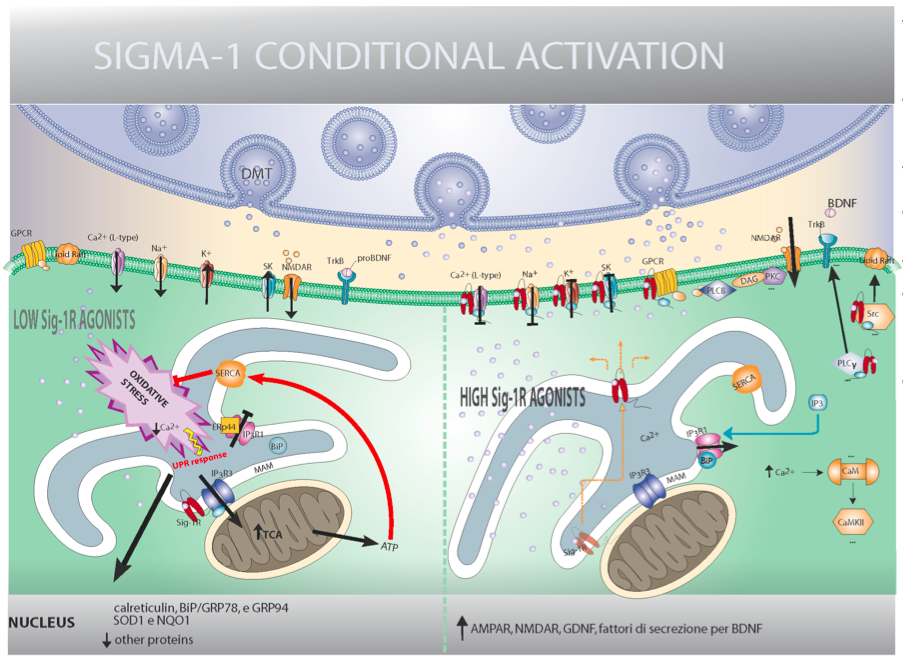About This Project
Our bodies produce very low doses of N,N-Dimethyltryptamine (DMT), a psychotropic substance. Recent findings suggest that DMT is an important modulator of Sig-1R, a receptor that plays important roles in neuropsychiatric diseases like schizophrenia, and depression. This project aims to further develop a hypothesis for the relation between DMT and Sig-1R, in hopes of providing novel insight into these neuropsychiatric diseases.Ask the Scientists
Join The DiscussionWhat is the context of this research?
DMT might be a modulator of Sig-1R in a complex cellular signaling that regulate cancer and neuronal plasticity. Due to technical constraints it has been uneasy in the past to measure and track the DMT molecule in human body, and hence it has been almost impossible to identify its physiological roles.
Moreover, Sig-1R was for a long time considered to be an orphan receptor, while in recent years it quickly became one of the most promising target in psychiatric and neurological molecular research. To this day, we know that Sig-1R is ubiquitous in many tissues and it plays a prominent role in coordinating cellular stress responses in mitochondria, while in neurons, Sig-1R extends this response to the cell's membrane level by interacting with numerous proteins involved in synaptic plasticity.
What is the significance of this project?
From 60s to late 70s psychedelic research was very active but was basically lacking of the technical resolution we have nowadays. Also, this type of research was mainly focused on the pharmaceutical use of psychedelic compounds, and not on their endogenous role. After a pause of nearly 40 years in this field, recent advances in our understanding of the neurobiology of psychedelics have led to renewed interest in their clinical potential in the treatment of various psychiatric disorders. It's interesting to note that these novel studies are showing that sub-hallucinogenic doses (similar to the physiological one) are those who particularly determine promising responses for treating anxiety, depression, PTSD, OCD and addiction. My research will focus on the endogenous role of DMT in the CNS.
What are the goals of the project?
I'm raising some basic funding to finish my literature research, review it, publish it in an open access journal (i.e. Frontiers) as a systematic review, and propose it to labs that are involved in Sig-1R studies.
My hypothesis is that DMT is regularly produced in low doses at the peripheral level and then transported in various tissues where it is stored. DMT is subsequently released during cellular stress, participating in stress response mechanisms mainly via Sig-1R activation.
I wrote this almost 22k words research one year ago, and then after dozens of new papers confirming my intuition I finally decided to follow it and try to publish in open access. Unfortunately I don't have access to a wet lab that could host this type of experiments so my hope is to write a compelling review.
Budget
With your help, I'll be able to complete my research and publish my hypothesis.
In case the target amount would be reached but for whatever reason I'd not able to publish – all the money will go to MAPS.org as a donation for their research.
The received funding will be specifically needed for the following activities:
- Submitting the manuscript as a "Hypothesis and Theory" at Frontiers in Physiology or equivalent Frontiers Journal
Meet the Team
Team Bio
I advocate and practise Open Science. I’m a student in molecularbiotechnology with a specialization in integrative neuroscience. From biophysics to cognitive neuroscience. During my studies I had the possibility to deepen the understanding of neuroscience across several layers of complexity: from the fundamental biological level to its many social dimensions. Neuroscience is becoming essential by the day to understand our evolving behavior as individuals and as a species. It’s a focus lens with a wide range of applications from personal growth to economics and politics. My main research interests have been the role of a particular class of molecular allostatic modulators in the outcome of complex psychosocial stress responses. My mentor has been Professor Benedetto Sacchetti, who introduced me to the study of the biological underpinnings of memory and emotion, especially the mechanisms of aversive and appetitive memories.
Here my group's website: http://biopeers.org/
Eugenio Battaglia
I advocate and practise Open Science. I’m a student in molecular biotechnology with a specialization in integrative neuroscience. From biophysics to cognitive neuroscience. During my studies I had the possibility to deepen the understanding of neuroscience across several layers of complexity: from the fundamental biological level to its many social dimensions. Neuroscience is becoming essential by the day to understand our evolving behavior as individuals and as a species. It’s a focus lens with a wide range of applications from personal growth to economics and politics. My main research interests have been the role of a particular class of molecular allostatic modulators in the outcome of complex psychosocial stress responses. My mentor has been Professor Benedetto Sacchetti, who introduced me to the study of the biological underpinnings of memory and emotion, especially the mechanisms of aversive and appetitive memories. On the spare time I study metastability and mechanisms of coordination dynamics of human brains working together in social settings.
Additional Information
One year ago I had an insight. I followed that insight by spending 3 months night and day on Pubmed reading more than 1000 papers and writing down what was supposed to be my B.Sc thesis. Then I took a pause and after one year on novel findings I have enough conifirmation that my hypothesis might be right. I need to translate my reasearch in english and publish it in open access. Then I'll try to apply for a lab that can host my research development.Understanding the role of endogenous tryptamines in human physiology from Experiment on Vimeo.
[Video subject is Dr. David Presti in DMT: The Spirit Molecule a documentary on Rick Strassan's DMT pharmacological research http://thespiritmolecule.com/]

[This is the schema that resulted from my first review on this subject]
Project Backers
- 47Backers
- 100%Funded
- $1,600Total Donations
- $34.04Average Donation
